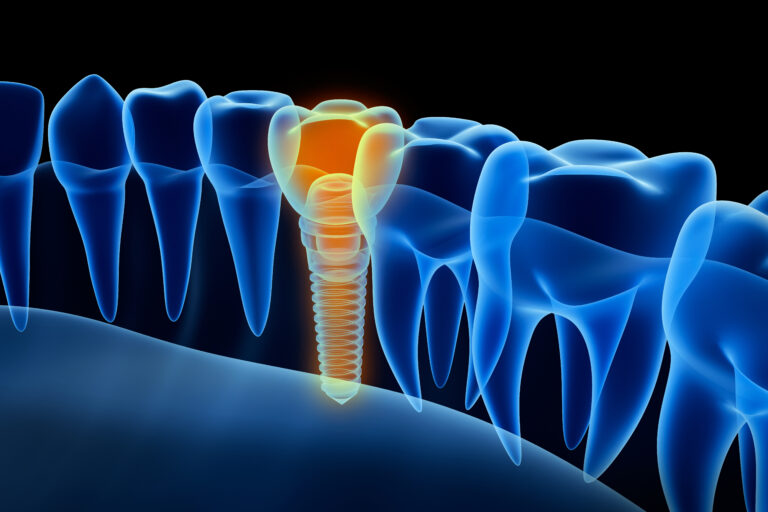Dental implants have quickly become a standard for tooth replacement. Unlike fixed bridges and removable dentures, dental implants replace both the visible portion of a missing tooth and the tooth root that is hidden beneath the gums. If you have lost one or more teeth, your dentist at Eagle Falls Dentistry can perform a quick evaluation of your oral and general health to determine whether you could benefit from dental implants in Bloomingdale.

Major Benefits of Dental Implants
Dental implants are a tooth replacement solution that offers several benefits. If you are missing teeth, your dentist can determine whether implants, bridges, or dentures are the best long-term solution for your smile.
- Over time, the lack of healthy tooth roots in the jaw due to missing teeth cause the bone to deteriorate, leading to additional dental health concerns. Because dental implants replace the root of a missing tooth, they halt the progress of bone loss in the jaw to eliminate many dental health risks.
- Dental implants do not require anything but healthy jaw bone to anchor them in place. Unlike bridges, which require the modification of adjacent healthy teeth to accommodate crowns, dental implants preserve the complete structure and health of your remaining natural teeth.
- Once osseointegration is complete, a dental implant will look and feel just like a natural tooth. You won’t need to worry that your implant will slip or loosen over time, nor will you need to set aside extra time to clean or care for removable dentures.
A dental implant is essentially an artificial tooth root that is surgically placed into the jawbone. One or more missing teeth can be replaced by attaching a crown, a fixed bridge, or a full set of dentures on top of the implants. The implant material, which is typically pure titanium, is extremely biocompatible since the bone treats the implant just as if it were bone. The effect is that the bone cells attach themselves to the implant and the interface between the bone and the implants is termed osseointegration. After an initial healing period, during which the implant(s) is left undisturbed underneath the gum tissue, it is uncovered and connected to a small post that serves as the foundation for the tooth or teeth that the implant will be supporting.
Indications for Implants
Implants may be used to replace teeth in single-tooth spaces, groups of two or more missing teeth, or where the teeth are completely missing in one or both jaws. Once placed, the implants are used to support individual crowns, or bridges that are retained rigidly to the implants. Implants may also be used to help retain removable dentures more securely.
Top Causes of Lost Teeth
Your teeth play a vital role in your ability to eat and speak; healthy teeth and jaws also affect your appearance. Missing teeth are a common concern among adults, but dental implants and other tooth replacement options can help you maintain your general health, your facial appearance, and the health of your remaining natural teeth.
- Accidents and injuries, particularly falls and sports injuries, are a common cause of tooth loss. The best way to reduce your risk of losing a tooth due to an accident is to get a customized sports mouth guard from your dentist and visit your emergency dentist immediately if you knock out a tooth.
- Periodontal disease is another common cause of lost teeth in adults. Over time, gum disease progressively destroys the connective tissues that hold the teeth in place. Visiting your dentist regularly for teeth cleaning and periodontal care are the best ways to prevent or halt gum disease.
Candidates for Implants
Most patients who are healthy and not restricted from undergoing minor dental surgical procedures, and who have good oral hygiene can have dental implants. Your dentist will assess the potential implant site to determine whether there is sufficient bone volume and gum thickness to allow placement of an implant. We begin by undertaking a clinical examination that will involve inspection, palpation and gentle probing of the potential implant site and adjacent teeth. In straightforward cases, simple dental x-rays are usually sufficient to examine the bone. In more complex cases, specialized implant x-rays, known as tomograms, are usually required (either plain x-rays or CAT scans).
Implants Function Just Like Teeth
implants are not made to come out. Implants are not the same as natural teeth but they function and feel very much like natural teeth. For patients that have lived with removable appliances, you will feel much more secure with implant retained teeth versus your old removable teeth.
Implants Can Be Rejected
Implants that fail do so because the bone has not integrated sufficiently with the implant surface. Hence, implants are not “rejected” like an organ transplant; they simply fail to bond with the bone. This may occur if the bone is very soft at the time the implant is placed, or if the implant is initially unstable. Other reasons include inadvertent loading of the implant via a removable denture or by the action of chewing hard food over the implant site at the early stages of healing. Infection may also cause an implant to be lost. Most modern implant systems report success rates of 85-95% over a 5 to 15 years period.
Smoking and Implants Do Not Mix
Smoking affects the healing of bone and soft tissue, by reducing the nutrients and minerals in the tissues and by reducing blood supply. This means that smoking is one of the biggest risk factors in failure of dental implants. Recent studies estimate that the chances of failure increase by two to three fold in a smoker. Gum and bone like a warm, moist environment and smoking produces a hot, dry environment.
Treatment for Failed Implants
In most situations, an implant can be replaced if it fails to bond with the bone provided that adequate bone and gum tissue is present. Failures do not occur very often but they do occur.
Wearing Dental Appliances Following Surgery
In most cases, existing dentures and other temporary appliances can be worn immediately after implant surgery. There are exceptions but our goal is too minimize any esthetic concerns during the healing phase.
Procedures for Implant Placement
In most cases, implants can be placed using local anesthesia in our office. In more complex cases, we may recommend that the surgical phase be performed while you are under general anesthesia in a specialists office or in hospital environment.
After the Surgery
In most situations, a healing period of between 3 to 6 months is required before teeth can be attached to the implants. A temporary appliance can usually be made to provide function and aesthetics during this period. After initial implant placement, regular follow-up visits are required to ensure that healing is progressing as we would like. After the teeth are attached to the implants, regular check-ups are needed every 6 to 12 months. At these check-up appointments, the implants are inspected and examined to ensure that the supporting gum and bone remains healthy. X-rays are taken to examine the bone structure around the implant.
Home Care for Dental Implants
For the implant to function well and to remain healthy, proper oral hygiene must be performed at home on a daily basis. Special cleaning aids (brushes, and floss) are widely available. We will provide instructions on the proper use of these cleaning aids. It is important to note that no metal scrapers should ever come in contact with the implants because metal scalers will scratch the surface of the implants, which is not desired.
